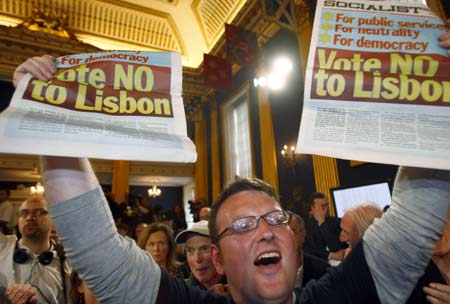
Irish celebrate as voters rejected Lisbon Treaty on the European Union reform on June 13, 2008. (Xinhua/Reuters Photo)
Under the treaty, the European Commission would be cut down from 27 to 18 members, the decision-making process would be based on majority instead of unanimous votes, and the power of the 785-seat European Parliament be strengthened.
Nonetheless, due to a lack of interest in voting and digesting the real meaning in between the words of the 287-page treaty, the turnout below the minimum 45 percent requested for a successful "Yes" vote has greatly affected the results of voting.
Those opposing the treaty, though not in a majority, are a resolute bunch who turned out in the polling stations and made their voices heard.
Led by Sinn Fein President Gerry Adams, the "No camp" believes that the treaty, which would reduce the veto powers of individual members, especially small countries with small populations, would undermine Ireland's sovereignty on moral, military and financial matters.
Ireland, a member of the EU for 35 years, has always been the direct beneficiary of its policies. With the 32 billion pounds (some 64 billion U.S. dollars) EU grants over the years, it has emerged from a poor, agrarian country into the second richest country (per capita) in the region after Luxembourg.
Still, the Lisbon Treaty has instilled genuine concerns among the Irish public. Farmers in the country have benefited from two-thirds of Ireland's EU subsidies. They fear that the EU reforms as blueprinted in the Lisbon Treaty would cut their subsidies and hence impede rural development.
There are also voters who are worried that their country's long-cherished neutrality in foreign and defense affairs since Ireland's independence from Britain could be compromised under the EU's new majority voting system. Others are concerned about Ireland's strict ban on abortion might be tampered with in future EU laws.
In addition, Ireland's favorable 12.5 percent corporate tax as compared with 28 percent in Britain has long been the key attraction to foreign companies and investment. The Irish fear a centralized EU taxation system might lead to interference into their own system and damage the country's economic prospect.
What's more, with EU expansion, more and more immigrants from eastern European countries are rushing into the Irish job market, including some 200,000 job seekers from Poland and the Baltic states. Local residents worry that their own jobs might be at risk.